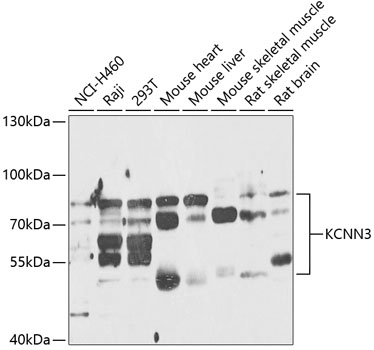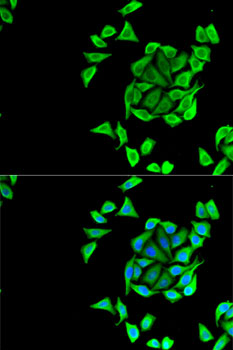Signal Transduction Antibodies 1
Anti-KCNN3 Antibody (CAB14012)
- SKU:
- CAB14012
- Product Type:
- Antibody
- Reactivity:
- Human
- Reactivity:
- Mouse
- Reactivity:
- Rat
- Host Species:
- Rabbit
- Isotype:
- IgG
- Antibody Type:
- Polyclonal Antibody
- Research Area:
- Signal Transduction
Description
| Antibody Name: | Anti-KCNN3 Antibody |
| Antibody SKU: | CAB14012 |
| Antibody Size: | 20uL, 50uL, 100uL |
| Application: | WB IF |
| Reactivity: | Human, Mouse, Rat |
| Host Species: | Rabbit |
| Immunogen: | Recombinant fusion protein containing a sequence corresponding to amino acids 237-426 of human KCNN3 (NP_740752.1). |
| Application: | WB IF |
| Recommended Dilution: | WB 1:500 - 1:1000 IF 1:50 - 1:100 |
| Reactivity: | Human, Mouse, Rat |
| Positive Samples: | NCI-H460, Raji, 293T, Mouse heart, Mouse liver, Mouse skeletal muscle, Rat skeletal muscle, Rat brain |
| Immunogen: | Recombinant fusion protein containing a sequence corresponding to amino acids 237-426 of human KCNN3 (NP_740752.1). |
| Purification Method: | Affinity purification |
| Storage Buffer: | Store at -20'C. Avoid freeze / thaw cycles. Buffer: PBS with 0.02% sodium azide, 50% glycerol, pH7.3. |
| Isotype: | IgG |
| Sequence: | VARK LELT KAEK HVHN FMMD TQLT KRIK NAAA NVLR ETWL IYKH TKLL KKID HAKV RKHQ RKFL QAIH QLRS VKME QRKL SDQA NTLV DLSK MQNV MYDL ITEL NDRS EDLE KQIG SLES KLEH LTAS FNSL PLLI ADTL RQQQ QQLL SAII EARG VSVA VGTT HTPI SDSP IGVS STSF PTPY TSSS SC |
| Gene ID: | 3782 |
| Uniprot: | Q9UGI6 |
| Cellular Location: | Membrane, Multi-pass membrane protein |
| Calculated MW: | 47kDa/48kDa/82kDa |
| Observed MW: | 50-85kDa |
| Synonyms: | KCNN3, KCa2.3, SK3, SKCA3, hSK3 |
| Background: | Action potentials in vertebrate neurons are followed by an afterhyperpolarization (AHP) that may persist for several seconds and may have profound consequences for the firing pattern of the neuron. Each component of the AHP is kinetically distinct and is mediated by different calcium-activated potassium channels. This gene belongs to the KCNN family of potassium channels. It encodes an integral membrane protein that forms a voltage-independent calcium-activated channel, which is thought to regulate neuronal excitability by contributing to the slow component of synaptic AHP. This gene contains two CAG repeat regions in the coding sequence. It was thought that expansion of one or both of these repeats could lead to an increased susceptibility to schizophrenia or bipolar disorder, but studies indicate that this is probably not the case. Alternatively spliced transcript variants encoding different isoforms have been found for this gene. |
| UniProt Protein Function: | KCNN3: Forms a voltage-independent potassium channel activated by intracellular calcium. Activation is followed by membrane hyperpolarization. Thought to regulate neuronal excitability by contributing to the slow component of synaptic afterhyperpolarization. The channel is blocked by apamin. Belongs to the potassium channel KCNN family. KCa2.3/KCNN3 subfamily. 2 isoforms of the human protein are produced by alternative splicing. |
| UniProt Protein Details: | Protein type:Membrane protein, multi-pass; Membrane protein, integral Chromosomal Location of Human Ortholog: 1q21.3 Cellular Component: cell soma; integral to membrane; plasma membrane Molecular Function:calmodulin binding; small conductance calcium-activated potassium channel activity Biological Process: synaptic transmission |
| NCBI Summary: | Action potentials in vertebrate neurons are followed by an afterhyperpolarization (AHP) that may persist for several seconds and may have profound consequences for the firing pattern of the neuron. Each component of the AHP is kinetically distinct and is mediated by different calcium-activated potassium channels. This gene belongs to the KCNN family of potassium channels. It encodes an integral membrane protein that forms a voltage-independent calcium-activated channel, which is thought to regulate neuronal excitability by contributing to the slow component of synaptic AHP. This gene contains two CAG repeat regions in the coding sequence. It was thought that expansion of one or both of these repeats could lead to an increased susceptibility to schizophrenia or bipolar disorder, but studies indicate that this is probably not the case. Alternatively spliced transcript variants encoding different isoforms have been found for this gene. [provided by RefSeq, Feb 2011] |
| UniProt Code: | Q9UGI6 |
| NCBI GenInfo Identifier: | 17367120 |
| NCBI Gene ID: | 3782 |
| NCBI Accession: | Q9UGI6.1 |
| UniProt Secondary Accession: | Q9UGI6,O43517, Q86VF9, Q8WXG7, B1ANX0, |
| UniProt Related Accession: | Q9UGI6 |
| Molecular Weight: | 736 |
| NCBI Full Name: | Small conductance calcium-activated potassium channel protein 3 |
| NCBI Synonym Full Names: | potassium intermediate/small conductance calcium-activated channel, subfamily N, member 3 |
| NCBI Official Symbol: | KCNN3 |
| NCBI Official Synonym Symbols: | SK3; hSK3; SKCA3; KCa2.3 |
| NCBI Protein Information: | small conductance calcium-activated potassium channel protein 3; SKCa 3 |
| UniProt Protein Name: | Small conductance calcium-activated potassium channel protein 3 |
| UniProt Synonym Protein Names: | KCa2.3 |
| Protein Family: | Small conductance calcium-activated potassium channel protein |
| UniProt Gene Name: | KCNN3 |
| UniProt Entry Name: | KCNN3_HUMAN |
View AllClose








